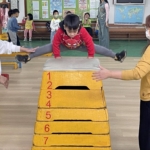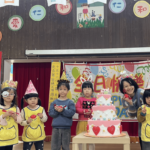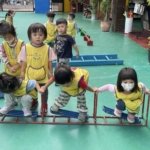As the earth revolves around the sun, it is already late October, and there are still two months to go before we bid farewell to the year 2024 and prepare for the arrival of the new year 2025.
Children between the ages of 3 and 6 are not yet mature in their concept of time and have no sense of the passage of time. At first, they will use a larger unit, "day", to count, and today, tomorrow, and the day after tomorrow are the same every day in their little minds.
Use the morning light assembly time to explore and share with the children using the calendar and digital clock that the earth rotates around the sun, one revolution is a day, and one revolution around the sun is a year, and let the children experience this. Remind them that time is gone and will never come back, so they should cherish it and grasp it.
The concept of time is part of the cognitive development of young children. One of the benefits of school life is that it builds up the concept of time through a regular routine, for example, what time to go to school, what time to eat, what time to leave class, and what time to be picked up by parents.
However, as the saying goes, "it is easy to know but difficult to do", "time concept" is not only the "cognition" of the concept of time, but more importantly, it is the ability to "execute" after knowing it; children are usually late for school because they are bedridden, want to sleep, and can't get up.
Cultivating a Sense of Time: The Morning Glory Award
In order to cultivate the children's sense of time and the habit of being punctual and arriving at the kindergarten by 8:30 a.m. at the latest, we have developed the Morning Glory Reward and the SOP process.
First, make a list of the names of the children in each class, arrange them according to the floor and stick them next to the washbasin in the activity room. As long as the children enter the school before 8:30am, the teacher at the entrance will give them a polka-dot sticker. After getting the sticker, they should first find their own class, then find their own names and the day of the week, and then stick the polka dots on the column.
By the way, the polka dots are colorful and different every day. Seemingly unassuming activities conceal hidden abilities, such as word recognition and spatial concepts - class name, own name, day of the week and location - all of which are indispensable. If you want to get a prize, you need to be able to do it, so that the children can learn from life.
It's easier to know than to do, and it's even harder to keep at it.
The cultivation of these concepts is ongoing and requires the assistance and teaching of parents and teachers. Children have strong memories and absorb quickly like sponges. The real test is the attitude of perseverance, as long as the teacher takes the child to practice a few times, he or she will know how to stick stickers.
We have been running the Morning Glory Award program for many years, and the principal has found that it has a lot to do with parents and teachers. As long as teachers pay attention to it and encourage it, most of the children will care about it, and it's a kind of small honor.
Also, in order to encourage children not to take off too often, we rewarded children with perfect attendance by counting the number of children who attended the school on that day. In August, 37% of the children had perfect attendance and in September, the percentage increased to 47%, which is a good phenomenon.
Developing good habits at an early age and establishing a disciplined life, habits and attitudes will benefit you throughout your life.
Peace to your family.
Mandy





